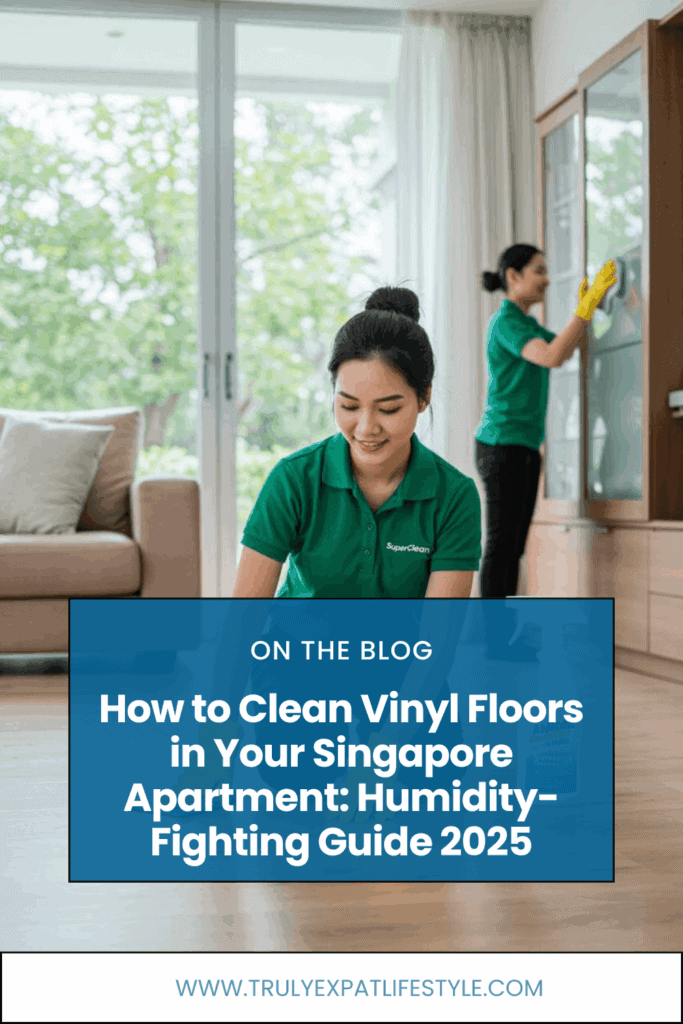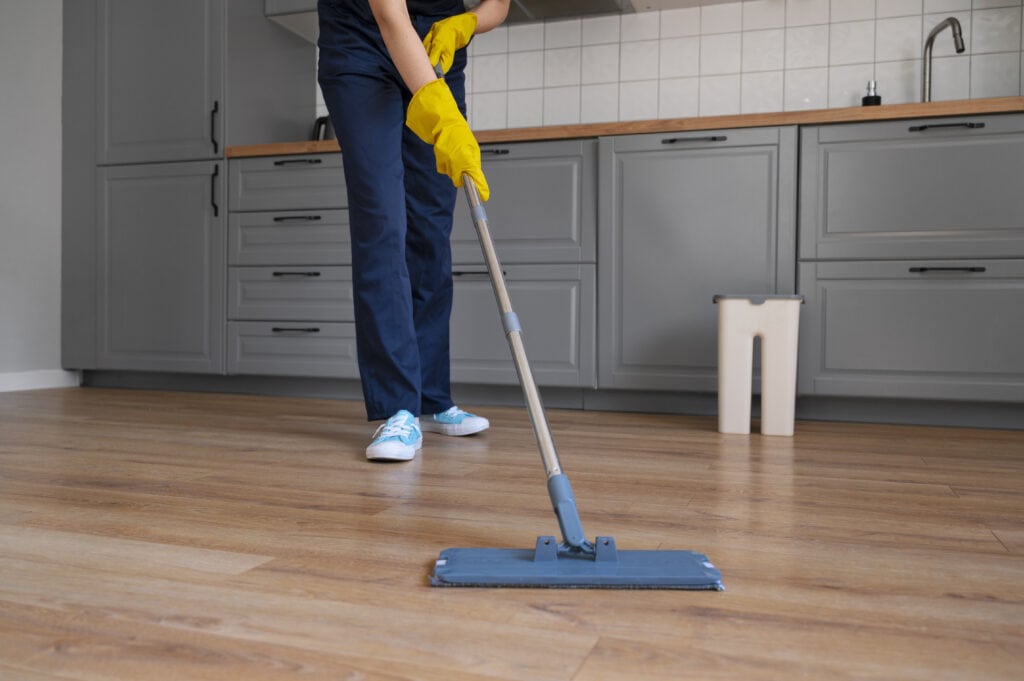
Vinyl flooring is a common feature in many HDB flats and condos across Singapore, and for good reason. It’s budget-friendly, durable, and stands up well to everyday wear and tear.
Table of Contents
However, Singapore’s warm and humid climate can make vinyl care a bit tricky. From sticky spots and dull finishes to mould creeping along the edges, it’s easy to run into problems if you’re not sure how to clean it properly. This is especially true for Singapore expats or new homeowners who are still setting up their homes and may be unfamiliar with local conditions and cleaning methods.
In this guide, we’ll walk you through how to clean and maintain vinyl floors the right way, from daily upkeep to deeper cleans before your lease ends, so your home stays fresh, safe for kids and pets, and deposit-ready.
Types of Vinyl Flooring in Singapore’s HDBs and Condos
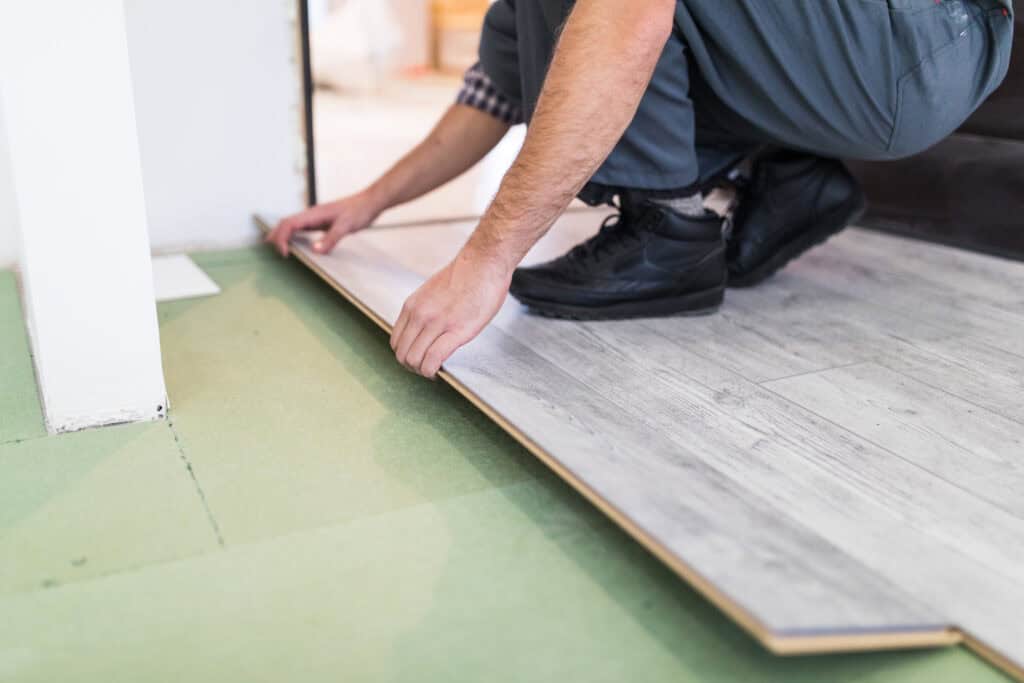
Before jumping into cleaning techniques, it helps to understand what kind of vinyl flooring you’re working with. In Singapore, the most common types include:
1. Luxury Vinyl Tiles (LVT): These mimic stone or wood textures and are popular in modern condos and new HDB flats. They’re durable and water-resistant, but abrasive tools can scratch them.
2. Vinyl Sheets: Often used in older rental flats, vinyl sheets are budget-friendly and easy to install. However, the seams can collect dirt if not properly sealed.
3. Click-lock Vinyl Planks: These are common in newer apartments, especially those that underwent recent renovation. They’re floating floors, meaning that they’re not glued down. However, water and moisture trapped underneath can cause warping or bubbling.
Knowing the types of vinyl flooring helps you tailor your cleaning method. All types are fairly low maintenance, but improper cleaning can lead to dullness, stickiness, or even permanent damage.
Why Expats Should Care About Cleaning Vinyl Floors in Singapore
If you’re renting, maintaining your vinyl floors isn’t just about hygiene. It’s also about protecting your deposit. Damaged or discoloured flooring can result in costly deductions when your lease ends.
Singapore’s climate adds another layer of challenge. High humidity, indoor air conditioning, and regular rainfall can cause vinyl floors to trap moisture and attract mould if not cleaned properly.
Singapore expats also often live with young children or pets, making safety a top priority. That’s why using harsh chemicals as a vinyl floor cleaner isn’t ideal when you’ve got little ones crawling or playing on the floor.
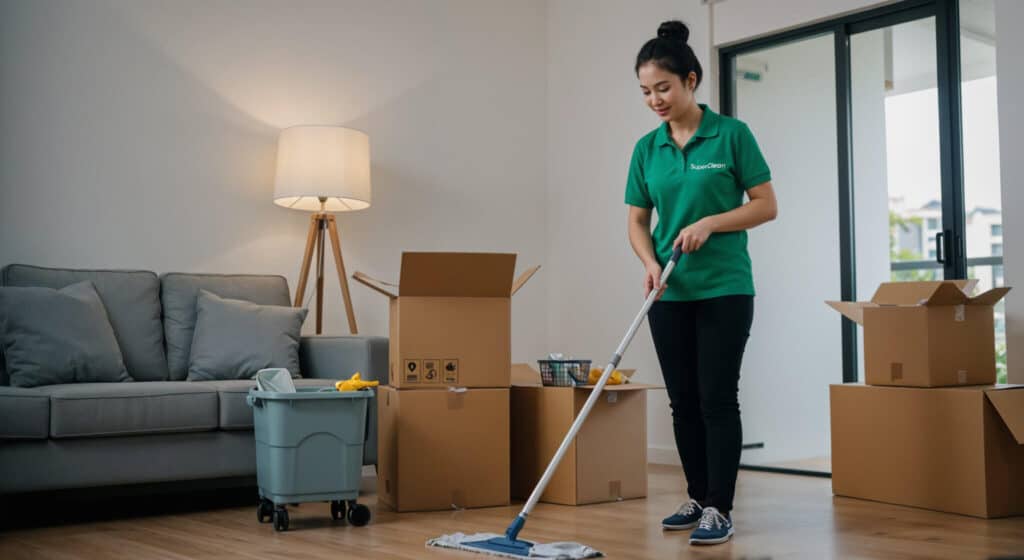
How to Clean Vinyl Floors Step-by-Step
Here’s a beginner-friendly, step-by-step method to clean vinyl floors safely in a Singapore apartment. Whether you’re tackling everyday dust or doing a monthly deep cleaning, this routine will help maintain your flooring without causing damage.
Step 1: Sweep or Vacuum
Start by removing surface dirt, dust, hair, and grit. These tiny particles may seem harmless, but over time, they can cause fine scratches on your vinyl floor. It can happen especially in high-traffic areas like hallways or near entry doors.
Use a soft-bristled broom or a vacuum cleaner with a “hard floor” or “bare floor” setting (without a rotating brush). If you’re using a robot vacuum, make sure it’s safe for vinyl and doesn’t drag dirt across the surface.
Step 2: Prepare a Gentle Cleaning Solution
In a bucket, mix warm water with a few drops of a pH-neutral vinyl floor cleaner or mild dish soap. Avoid harsh or abrasive products like bleach, ammonia, or alcohol-based cleaners, as they can strip the protective layer off vinyl.
If you prefer to use something more natural, white vinegar works too. Mix 1 part vinegar to 10 parts water. It’s great for deodorising, lifting everyday grime, and keeping the floor streak-free without leaving a chemical smell behind.
Step 3: Mop with a Damp (Not Wet) Microfiber Mop
Dip your microfiber mop into the solution and wring it out well. Vinyl floors don’t do well with excess water. Standing moisture can seep into seams or edges, leading to warping, bubbling, or mould, especially in Singapore’s humid climate.
Moreover, try to work in small sections–using light, even strokes. Pay attention to sticky spots or areas where kids or pets tend to make a mess.
Step 4: Rinse with Clean Water
After mopping with a cleaner or vinegar solution, it’s a good idea to rinse. Fill another bucket with clean water, dampen your mop (or separate one), and go over the floor again.
These steps remove any leftover that could leave streaks, attract dust, or make the floor feel tacky underfoot. It’s a common issue if SAP isn’t fully wiped off.
Step 5: Dry the Floor
Finally, dry the floor thoroughly. You can use a clean, dry towel to go over it by hand or let your ceiling fan or air-con help speed up the process.
In Singapore’s high humidity, drying isn’t just for appearance. It prevents moisture buildup that could lead to mould, especially around skirting boards and furniture legs.
What NOT to Use on Vinyl Floors in Singapore Homes
When figuring out how to clean vinyl floors, knowing what not to use is just as important as knowing the correct method. Using the wrong products or tools can lead to permanent damage.
Here are common mistakes to avoid:
● Steam Mops -Although they promise a “deep clean,” steam mops are not vinyl-friendly. High temperatures and intense moisture can seep into the seams and edges of vinyl flooring. Over time, this causes bubbling, warping, or even peeling of the top layer.
● Abrasive Scrubber or Scouring Pads – Avoid anything rough, like steel wool or hard-bristle brushes. These can scratch the surface of your vinyl floors and gradually wear down the protective coating. Once the layer is gone, the floor becomes more vulnerable to stains and dirt buildup.
● Ammonia-Based Cleaners – Ammonia may work well on tiles or windows, but it’s harsh for vinyl. It can strip away the finish, leaving the surface looking dull, faded, or discoloured. Over time, repeated use can make the flooring brittle and more prone to cracking.
● Bleach and Harsh Chemical Cleaners – Products with strong chemicals (like chlorine bleach or acetone) may remove stains, but they can also damage the floor’s top layer. Furthermore, these substances are harmful to children and pets.
Pro Tips: Always do a small patch test in an inconspicuous area before trying any new product—just to be safe.
How Humidity Affects Vinyl Floors (and How to Prevent Issues)
Singapore’s tropical humidity is not your vinyl floor’s best friend. According to the Meteorological Service Singapore, with the onset of the Southwest Monsoon, nights in Singapore are expected to remain warm and humid, with temperatures staying above 29°C on several nights.
This persistent heat and moisture can impact flooring materials like vinyl, especially in less ventilated rooms like bathrooms or kitchens. Here’s how it can affect your floors, and how to stay ahead of potential problems:
Common Issues:
- Sticky or tacky surfaces: Caused by soap buildup or high indoor moisture
- Bubbling or lifting edges: Often due to trapped water or poorly ventilated rooms
- Musty smell or mould under planks: Especially in kitchens or bathrooms
Prevention Tips:
- Run a dehumidifier or air conditioner to keep humidity below 60%
- Use doormats to reduce water tracked in on rainy days
- Ventilate rooms, especially after mopping or showering
- Dry spills immediately to prevent seepage into seams
By adjusting your cleaning routine to factor in the local climate, you can extend the life of your vinyl floors and avoid costly repairs.
How Often Should You Clean Vinyl Floors in a Singapore Rental?
You don’t need to mop your vinyl floors every single day. However, sticking to a regular cleaning vinyl floor schedule can make a big difference in how your floors look and last over time.
Routine care helps prevent the gradual buildup of dirt, dust, and grime, especially in high-traffic areas like hallways or living rooms.
In Singapore’s humid climate, moisture and mildew can develop quickly, particularly near windows, entryways, and kitchens. A consistent cleaning habit helps stop these issues before they happen.
Here’s when you should clean your vinyl floors:
Daily (Optional): Do a quick sweep or vacuum to remove dust, crumbs, pet hair, and sand particles, especially near doorways and balconies. This step is optional, but useful if you wear shoes indoors or have kids and pets running around.
Weekly: Use a damp microfiber mop with a gentle, pH-neutral cleaner to tackle general dirt, light stains, and footprints. This light maintenance mop helps prevent sticky buildup and keeps the floor’s protective coating intact. Be sure to wring out the mop well to avoid excess moisture.
Monthly: Do a more thorough deep clean. Move lightweight furniture (like dining chairs or floor mats), mop under them, and rinse the floor with clean water after using detergents or vinegar. Focus on edges, corners, and areas near windows or doors where dust and humidity collect most.
Every 3-6 Months: Take time to inspect your vinyl floors for subtle signs of damage. Look out for:
- Bubbling or warping, which may suggest trapped moisture
- Mould or mildew along the edges, especially near kitchens or bathrooms
- Scratches in high-traffic zones (you can add felt pads under furniture to reduce water)
If you spot any issues early, it’s easier to resolve them without major intervention—or a call from your landlord.
For you who live with pets or young children, you may want to sweep and mop more often. Vinyl floors are durable, but extra activity means more chances for dirt, spills, and scuff marks to appear.
Tips for Keeping Your Vinyl Floors Rental-Ready
Whether you’re planning to move out soon or simply want to avoid unexpected repair costs, it’s a smart idea to keep your vinyl floors in excellent condition. Most landlords in Singapore expect rental units—especially HDB flats and condos—to be returned in clean, damage-free condition.
Vinyl flooring Singapore is relatively low-maintenance, but without the right care, it can still scratch, warp, or discolour over time. Follow these practical tips on how to clean vinyl floors to keep them looking spotless and rental-ready:
1. Use Felt Pads or Furniture Legs
Chairs, tables, and bed frames can leave scratches or pressure dents on vinyl flooring. Attach felt protectors to the bottom of furniture legs, especially on pieces you move often (e.g., dining chairs or coffee tables). It’s a small investment that can save you from costly deductions later.
2. Never Drag Furniture, Lift Instead
Dragging heavy furniture can leave unsightly gouges or scuff marks. Always lift when rearranging your space. If the furniture is too heavy, place a towel or moving pad underneath to glide it gently without damaging the floor.
3. Place Rugs in High-Traffic Areas
Strategic rug placement can do wonders for protecting vinyl floors. Use rugs or floor runners near entryways, under dining tables, and in children’s play areas to absorb impact, trap dirt, and reduce wear. Choose rugs with non-slip, non-staining backings that are safe for vinyl flooring.
4. Wear Indoor Slippers at Home
Singapore’s streets can track in dust, tiny rocks, or oily grime. Make it a habit to remove shoes at the door and switch to indoor slippers. This reduces the chance of scratching your floor or dulling its finish with gritty debris.
5. Clean Up Spills Immediately
Vinyl is water-resistant, but not waterproof. If water, juice, or cleaning chemicals are left to sit too long, they can seep into the seams, causing bubbling or staining. Always blot up spills right away using a soft cloth or paper towel.
6. Deep Clean Before Moving Out
Before handing the keys back to your landlord, do a thorough deep clean of your floors. Move furniture, mop corners, and check for sticky residue or dull spots.
If you notice any scuffed or discoloured areas, try to address them early with spot treatment or gentle buffing using a vinyl-safe cleaner.
7. Keep a Floor Maintenance Routine
A floor that’s cleaned weekly and handled with care will always look better than one that’s only cleaned in a rush before moving out. Plus, a well-maintained floor gives your home a more polished, comfortable feel day-to-day.
When Should You Consider Apartment Cleaning Services?
Sometimes, life in Singapore gets too busy for regular floor care, especially for working professionals or parents. If your floors haven’t been cleaned in weeks or need serious deep cleaning, it might be time to call in the experts.
Hiring home or apartment cleaning services is a great way to:
- Deep clean before or after a move
- Handle built-up grime or hard-to-reach dirt
- Professionally sanitise floors without damaging them
- Save time if you’re juggling work, school runs, or guests
Many cleaning companies in Singapore, such as SuperClean SG, now prioritise eco-friendly, kid-and pet-safe floor treatments, so you don’t have to worry about harsh chemicals. Remember to look for providers with experience in vinyl flooring Singapore care.
Clean Smart, Live Easy
Figuring out how to clean vinyl floors in Singapore doesn’t have to be overwhelming. With a few simple routines and the right tools, you can maintain spotless, rental-safe floors without spending hours scrubbing.
Humidity may be part of the lifestyle here, but it doesn’t have to ruin your floors. Stay proactive, avoid harsh chemicals, and clean with intention. Whether you’re living in a sleek condo or a cosy HDB rental, your vinyl floors can stay shiny, safe, and satisfying—all year round.
Bio: SuperClean SG is a trusted cleaning service provider in Singapore, specialising in home cleaning and deep cleaning services. From routine tidying to intensive vinyl floor care, we prioritise eco-friendly solutions that are designed to keep your living spaces safe for children, pets, and daily life.
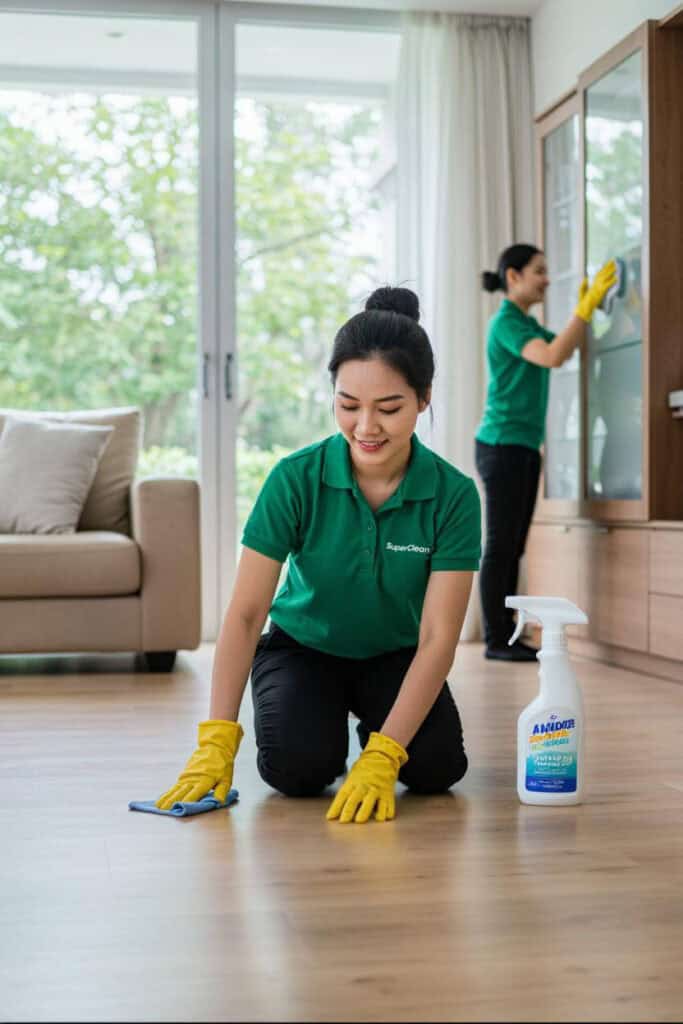
Thanks for taking the time to read this article. I hope this post has given you the information you need. If you have any recommendations, tips or advice, I would love for you to share them in the comment section below!
This post may contain affiliate links, meaning we may receive a commission at no extra cost if you purchase through a link. Please see our full disclosure for further information.
Check out my Instagram page or join the Truly Expat Facebook group.
Pin it for later
